Text
One thing I’ve learned about writing is ”give everything a face”. It’s no good to write passively that the nobility fled the city or that the toxic marshes were poisoning the animals beyond any ability to function. Make a protagonist see how a desperate woman in torn silks climbs onto a carriage and speeds off, or a two-headed deer wanders right into the camp and into the fire. Don’t just have an ambiguous flock of all-controlling oligarchy, name one or two representatives of it, and illustrate just how vile and greedy they are as people.
it’s bad to have characters who serve no purpose in the story, but giving something a face is a perfectly valid purpose.
86K notes
·
View notes
Text
How to Write a Character’s Death Effectively
It’s a strange thing to think about—writing a death effectively. You could come up with endless ways for a character to die and they’d all accomplish the same goal of removing them from the story.
However, deaths always have meaning in fiction. The ones that make it to print are the deaths that are written well.
Here are a few things to avoid and a few others to strive for when writing a death scene.
Things You Consider When a Character Dies
1. Who Is Essential to Your Story?
Think about which characters are essential to completing your plot/theme. If someone isn’t essential, their death won’t be as meaningful to the reader or as purposeful to your plot.
This isn’t to say you can only kill protagonists and your most important secondary characters. But if you only have one death in your book or short story and it has little to no effect on the plot, that character might better serve the purpose of your story by living.
You should also consider who is integral to a character’s future development if you’re writing an ongoing series. The protagonist may have a best friend in Book 1, but by the end of the book, they go their own ways. Books 2 and 3 don’t feature the best friend, so if they die in Book 1 and your projected plot developments don’t change, their death isn’t essential
2. What Is the Reason for the Death?
Real life deaths don’t always have a reason, but the vast majority of fictional deaths do. Unless you’re writing about a theme specifically involving a purposeless death (maybe to write about grief or another way a character handles what happens afterward), each death should have a meaning.
Reasons for Deaths in Fiction
Bitter irony (example: a character who fears driving dying in a car crash)
Bringing the character’s story back to close foreshadowing threads (example: a character gets introduced into the plot by defending someone getting robbed, then they die in a robbery gone wrong)
Betrayal (example: a character’s best friend betraying them in a way that leads to their direct/indirect death)
Growth (example: a selfish or evil character learning to be selfless/good, then giving up their life to save someone else)
Other character’s growth (example: a book about forging your identity while grieving would likely start off with a death that’s meaningful to the protagonist in the beginning of the story) (Warning—be careful about this one turning into bad death tropes! Read the next section for examples.)
Good and Bad Deaths: Examples
Good: Beth March in Little Women
Beth’s character is supposed to exemplify a person who is 100% good and pure of heart. She dies remaining steadfast in her positive demeanor and giving nature. Her death causes the other members of her family to spin into different directions for their character developments. Most notably, Jo March decides to be kinder and more giving to those around her, which leads to the events in the rest of the book.
Reasons this trope works: Beth is the trope of an angelic, faultless young person dying without ever having done anything wrong. However, it’s not necessarily bad because it doesn’t erase an otherwise unrepresented group of people and doesn’t serve the purpose of a male character’s growth.
Bad: Fred Weasley in Harry Potter and the Deathly Hallows
In the book, Fred dies after the floor explodes while he, Harry, and others regroup during the battle of Hogwarts. Harry (and the reader) are shocked when the dust settles and Percy can’t get Fred to respond to anything.
This death has been described as “realistic” by the author who has lost all of my respect for being a transphobic bigot, so she won’t be named, because she said that it was unrealistic that every Weasley family member survived the battle.
Reasons this death doesn’t work: This death is supposed to be a shock. That’s it. It adds to the surviving characters’ collective grief, but does it change any of their personal developments? Does it alter the world around them? Does it affect their futures? I would argue no. If a Weasley death was supposed to be significant to the plot/purposeful, it would have been a more well-known and loved Weasley like Ron, Ginny, or Molly.
3. Are You Unknowingly Writing Death Tropes?
Here are the most common death tropes to avoid in your writing. They ultimately are hurtful cliches that serve no purpose. Your writing will be much stronger and more meaningful to readers if it doesn’t include these types of deaths:
“Stuffing Women in Refrigerators”: a female character dies so a male character can grow (Think: every superhero who has a dead mom) (Read more about the trope here.)
“Black Dude Dies First”: a person of color dies for seemingly no reason (especially when there are little to no POC left in the story). This trope comes from a history of racism and devaluing characters of color, so be aware that none of your characters’ deaths reflect this trope by filling your stories with representation/deaths of more than just POC. Also, any deaths of POC should not serve solely as the vehicle for a white protagonist’s development. (Read more about the trope here.)
“Bury Your Gays”: an LGBTQ+ character dies for seemingly no reason. They might also die to advance the straight protagonist’s narrative/when there are no other LGBTQ+ characters. It comes from a history of bigotry and prejudice
The Resurrection Trope: a character’s death doesn’t mean anything because it’s reversed/repeated in cycles. They never stay dead and neither do any other characters. If death has no consequences, it’s meaningless. (With the exception of very specific story lines, like Groundhog Day or Russian Doll.)
If you want to really do a deep dive into death tropes, this website has an excellent list of tropes that work for both fiction and movies/TV shows.
-----
Writing and workshopping a death to make it as meaningful and plot-essential as possible might take some time. You might even discover that the death shouldn’t happen at all.
Either way, learning about death tropes and effective techniques is a great way to improve your writing skills and your future stories.
587 notes
·
View notes
Text
Name Resources!
Several years ago one of my hyperfixations was names, and I just remembered today I have several name sites bookmarked that would be excellent sources for naming sims! Some of these are not resources for accurate information, but that’s not necessarily important to me as I don’t play a historically accurate game or anything simulating real life.
Sites that are (mostly) based on research:
Social Security Administration - has the top 1000 names in the US and downloadable archives of names with at least 5 occurrences going back to 1880.
Behind the Name - names and etymologies from cultures around the world. There’s also a sister site for surnames (which I have the most trouble choosing for sims!), themed name lists, a random generator, and a database of user-submitted names.
Medieval Names Archive - authentic, documented names from many cultures during the Medieval and Renaissance periods.
Kate Monk’s Onomastikon - names from many varied sources recorded throughout history.
Surname Database - search for a surname or browse the Surname Index
Generic baby name sites:
20,000 Names
Baby Names.com
BabyNamesPedia
Mom.com
Nameberry
Name Nerds
Names by Chinaroad
Name Generators:
Fantasy Name Generators
Noemata
Random Lists - Female Names, Male Names, Last Names
Serendipity
Seventh Sanctum
Squid.org Random Name Generator
And just for fun:
Utah Baby Namer
I also have documents full of interesting and weird names I saved from a site that I used to frequent but left because of its members’ problematic behavior. It seems to have shut down because even people who’ve never been there get a message that their IP is banned. Weird. Anyway I will be going through those in the near future in hopes of finding some gems, and when I do I will probable share.
Enjoy! 😁
668 notes
·
View notes
Text
Beginner Writer Guide
Beginner writer? Here’s everything you need to know
💜 The basics 💜
Every story consists of a few basic elements you should think about before starting:
Characters
Genre
Central message
Plot
Worldbuilding (especially important in any non-contemporary genre)
Narrative position (Point of view)
💜 Where to start? 💜
Start with your character! What is their story? What sort of predicament do they find themselves in that starts it all up, and why should we be interested in it? What flaw do they have that makes achieving their goal harder and how do they overcome this by the end of the story?
💜 Plot structure 💜

💜 Subplots & side-characters 💜
Of course you want more than just the one character (in most cases!), so you should think about what other characters are necessary to tell your story. Only create a character when they have something to add to the main story.
Then interweave these subplots with your main character’s journey.
💜 Thematic architecture 💜
What is the central message of your story? This is usually closely tied into what your protagonist is trying to learn and overcome.
What other questions are you exploring?
What themes pop up that can flesh out the purpose & meaning behind the story?
💜 Useful writing tools 💜

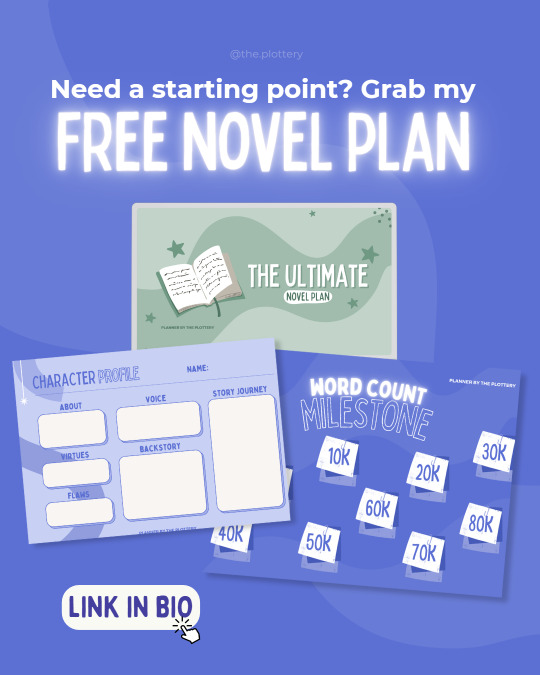
Remember to save this post so you can always refer back to it!
💜 Find my free Novel Plan through the link HERE or below!💜
Also...did you hear about my Black Friday deals?
💜 Novel Plotting Academy 💜
Get 40% off the full price and get lifetime access to the course, take it at any time that suits you. You’ll get all the knowledge and tools you need to plot your novel, from 30+ video lessons, character profiles, one page outlines, writing prompts, character formulas and trackers, and MORE.
Find NPA through the link HERE or below!
💜 Power Plotter 1:1 Coaching💜
Get a whole extra month of personal coaching for FREE when you sign up with the full payment plan (this means 4 extra calls on top of my usual 12) AND completely free lifetime access to Novel Plotting Academy.
Find my Power Plotter 1:1 Coaching through the link HERE or below!
If you have any questions, feel free to DM me! 💜
119 notes
·
View notes
Text
So you want to write a novel...
Hello, fledgling author! I heard through the grapevine that you’re interested in writing a novel but you’re not quite sure how to start.
Well, don’t worry about that at all — I’m here to help!

Do These 5 things BEFORE Starting to Write
Like anything else in this world, creativity can actually be broken down into logical steps. Sure, at the heart of it you’re going to need great ideas and words that draw the reader in, but these steps will build the foundation for you to grow from. Think of them as an abandoned concrete building and your ideas are the vines growing up and around its walls, beautifying it.
Write down your basic story concept
Plot your novel — at least to some extent
Flesh out your characters
Build your world
Set writing goals
But I don’t even have an Idea yet…
When we think about creating a novel, we’re always hearing about authors who wake up in the middle of the night with a great concept. It’s 3am… their eyes snap open, and in a flurry of notebooks and pencils (because they ALWAYS keep a notebook by their bed) they’ve plotted out the next big Young Adult success.
But what if that’s not you?
I’m here to tell you, you are not alone. If you want to write but don’t have your winning idea — an idea you feel deserves 175–300 pages or more — then just start small.
Well-known authors like Stephen King and George R.R. Martin got their start by writing small. Pick a few ideas that intrigue you, and write short stories about them. I’m willing to bet that by the time you’ve got a handful of them under your belt, you’ll have zeroed in on your Big Idea, without even actively trying.
Just Start Writing!
In the end, the most important thing to do if you want to be a writer, is write. Whether that involves taking the 5 steps to create your Big Idea, or messing about with short stories if you’re just at the experimentation phase. Sitting down every day and writing something, even if it’s just one good sentence, will do you a world of good.
Thanks for stopping by for this little writing chat. I’m looking forward to going more in-depth but hope that this intro was a good place to start :)
I’m rooting for you!
72 notes
·
View notes
Note
Hey uuh so if u don't mind.... I want some writing advice... I have heard that ppl don't often like stories with an ending where the main character gets amnesia... But I can't see my fic go anywhere else (The alternative route is dying and I DO NOT want to go down there...)
... Any... Advice? Thanks in advance!
wow i am so honored that you want my advice arisa! it sounds like you concieved your fic with the ending in mind which is already ten steps in the right direction. also, remember you are writing for YOU before anyone else. yes, you want readers to like the story you craft for them, but in the end it's YOUR story that you want to tell and you're the one who knows how to craft its meaning best!
to begin with, the reason why readers are often disappointed by endings where the character gets amnesia at the end is because they feel cheated of character growth. the point of a story is to develop a character from who they were at the beginning to who they are at the end. when a story wipes all that away, it leaves a dissatisfying, empty taste in readers' mouths and they wonder, "what was the point of reading this, then?" it's much like the ending where the character wakes up from a dream and we realize the whole story was made up. we think, "what did i get so invested in that for?" as we shake our heads and walk away.
now with this in mind, it sounds like your character's amnesia will be the culmination of their development (simply based on how the only other option was death). i'm thinking there will be a sacrifice involved which results in the mc losing memories and therefore exiting the role they filled in the story. sacrificing memories can be a good plot device if you use it correctly. but i think there are some things that should be set in place before you go down that route.
have a character who DOES remember everything the mc went through and who reacts to them in a manner that supports that. you can even hint at it, really (think marinette going to visit fu and smiling at his painting). this will create a link between their past life and current blank slate that satiates the reader, because those lost memories are still meaningful to the protagonist as well as someone who cares about them, even if the mc doesn't know it.
have the character show their growth in other ways that indicate their personality stayed the same, even if they don't remember how they got to that point. e.g., if this person's journey was about standing up for what's right, have them walking down a street, seeing an injustice, and stepping in to right it. then we the readers will think, "aww, they're still the same person even if they don't remember." that's what means the most to us <3
establish whether or not the character will ever get their memories back. is there a possibility the amnesia can be reversed? have the other characters who remember discuss it. is the memory wipe permanent and can't be undone? have the characters who remember discuss it. i love loose ends but i wouldn't recommend leaving this as one, simply because it will add to audience frustration if you don't address it.
cover your bases! make sure we know why the character had to lose their memories, how it completes the point of your story, and who it impacts in what ways. this will all satisfy the climactic decision, as well as just make your story stronger overall!
people like any story that's good, no matter the plot device. it's just a matter of how you use your plot devices to structure your narrative! always remember the basic elements of a story: who is your character, what do they want, and what are they going to do to get it? then, considering this, juxtapose who this person is at the beginning versus who they become by the end. that should give you your entire narrative arc, which you can then close in a fitting way.
thank you for the ask! i truly hope this helped :)))
54 notes
·
View notes
Text
EVERYONE. I SUBMITTED MY CHAPTER FOR THE INCUBATOR THING. JUST IN TIME.
0 notes
Text
Writing Tip #29
Finish your story as if we’ve reached a new beginning
{I’m posting a writing tip every day of NaNoWriMo}
10 notes
·
View notes
Text
50 words to use instead of said
Just to make this clear: you can and should use SAID in your writing.
It’s not a dirty word, and often is the the correct one to use. You don’t need to go through your manuscript and replace all the “saids” with synonyms, but that being said (see what I did there?), this is a really good list to refer to from time to time if you want to round out your vocabulary. Some situations might genuinely fit some of these verbs a bit better than a plain old “said.”
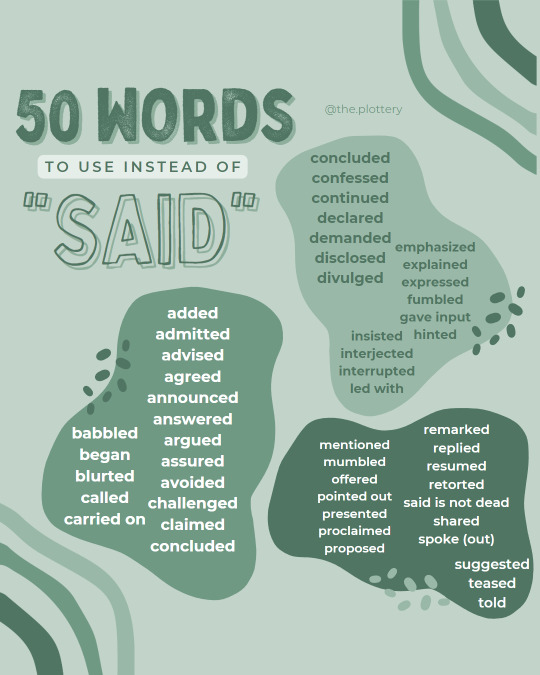
338 notes
·
View notes
Text
ART COMMISSIONS OPEN
Hey everyone! I have decided to officially open commissions for character art.
pricing is in USD as follows:
$10.00 per character Sketch (+ $5.00 for every additional OC in group drawings)
$20.00 per character Clean Lineart (+ $10.00 for every additional OC in group drawings)
$10.00 to add colour
$25.00 for a Coloured Portrait (singles only, must provide approximate face claim)
$25 for an illustrated full body style (+ $15.00 for every additional character) (best for character drawings!)
$50.00 for a Realistic Painting (singles only, must provide face claim)
How It Works: once you contact me, we work out the details of what you’d like for your art piece in terms of style, pose, character description, etc. I take half payment up front. I will report back frequently with “drafts”* as I go to make sure that we’re on the same page and everything looks good to you, and once we’ve landed on a final product, I take the second half of payment.
I average about four or five drafts per piece. I do charge for any major changes requested once I’ve already started (i.e. change of clothes once I’ve already started colouring or change of pose once I’ve already done the lineart), with prices in accordance to the amount of work going into the change.
DM me, email me at [email protected], or visit my website to get started!
STYLE EXAMPLES
sketch - $10
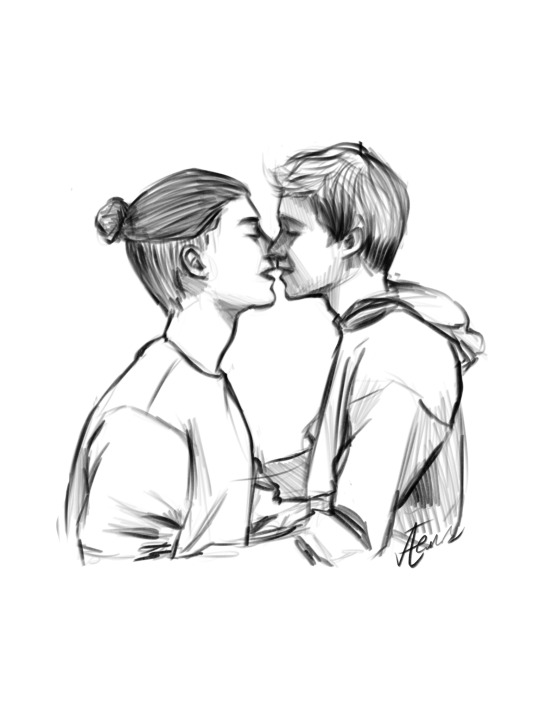

lineart - $20

add colour - $10
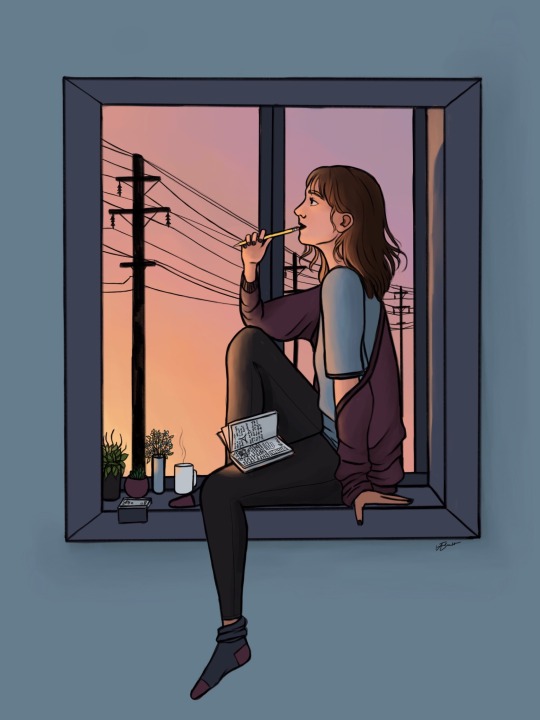
portrait/bust - $25
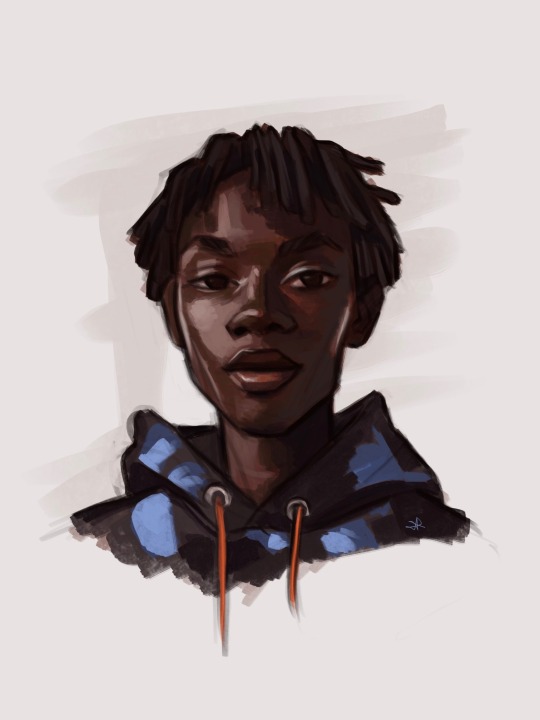

illustrated style - $25
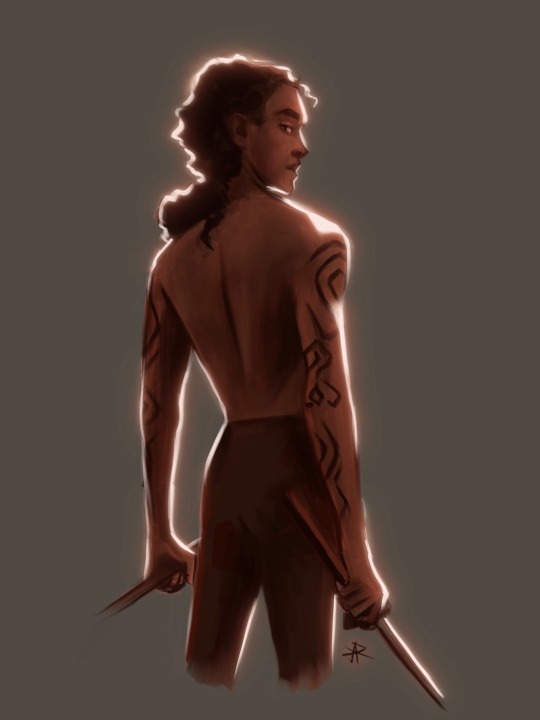

realistic painting - $50

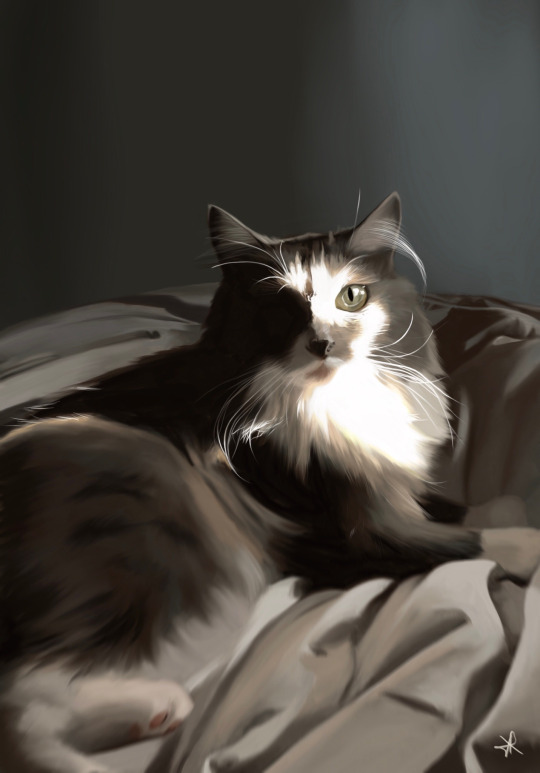
564 notes
·
View notes
Text
List of “God, I’m so in love with you but I’m also a coward, so hiding my feelings it is” prompts
“Your flirt game is so bad, no wonder you’re still single.” “My flirt game isn’t bad, and the person I like is a fucking idiot. That’s why I’m still single.” “…Okay, but why are you looking at me like that?”
“Why don’t you go marry them if you like them that much?” “…[Name], are you… Are you jealous?” “Am not.”
“You keep sabotaging my dates, and for why?” “Because… Because I know when someone’s an asshole and I don’t want you dating an asshole?”
“My God,” Character A whispers, brushing a strand of hair from Character B’s face; hears the distinct hitch of breath. “You’re so dense,” Character A says. “I’m not… I’m not dense,” Character B breathes out, leaning into Character A’s touch.
“You’re as dense as a cabbage, [name].”
“I would never like you that way.” “Oh, well, neither would I!”
“You’re always getting your heart broken.” “I wouldn’t be getting my heart broken if someone knew how to read the signs.”
“Why do you keep calling me an idiot in front of other people?” “Because you are an idiot.”
“Stop putting your arm around my waist. It’s so…” “…So?” “It’s weird, and I hate it. Because it’s doing things to me that I don’t like.”
“I’d never date you even if we were the last two people in this world. It goes against our friendship code,” Character A says, and Character B tries to hide the twinge of hurt crossing their face. “Yeah, well, I wouldn’t want to date you anyway, even if it were an option.”
3K notes
·
View notes
Text
Writing is hard. It stretches your creativity until you see holes in it, or worse, your plot. It can be lonely. It can be tiring. It can hurt your brain, and your pride, and your heart. It can feel like the worst thing you've ever done.
But it's worth it.
You're worth it.
So take care of yourself, okay? Take breaks, drink fluids, do whatever self-care you can do, no matter how small. Remember, there are people who care, and there are readers who need you - your story, your perspective, your impact.
And if you don't hear this from anyone else today, I'm so proud of you.
7K notes
·
View notes
Text
Troubleshooting Your Plot
Plots are such complicated things that often when something doesn’t work, we can tell that it’s falling apart, but we can’t really tell where. I’ve spent many hours picking apart my plots and looking for the loose thread, so here’s some ways I’ve noticed plots most commonly go wrong.
The character transformation isn’t believable
Very likely whenever an arc goes wrong it’s not because of the circumstances the character went through, it’s because the character didn’t have enough agency. If your characters are never forced to make tough decisions, they’re also never forced to change. I’d go back to their goal and motivation and look through your plot to see which ways they are actively choosing it again and again.
2. It feels rushed
Plots that meander or feel rushed are usually not due to the plot itself, but pacing issues within it. Before you touch your outline, look into your scenes and see where you could be adding more description. Are you using all five senses? And if you are, are you getting into your character’s head? Sometimes all a rushed scene needs is a moment of reflection, a little “check-in” with your protagonist.
Look through your work and mark down what the pacing of each scene should be. Fast-paced action scenes should have shorter paragraphs and less reflection than say a deep discussion between two characters.
3. It’s too short!?
When it’s not an issue with pacing the problem might be with the scope. Is the transformation you’re writing large enough for the word count you were expecting? Lord of the Rings couldn’t have been written in a novella, and an episode of Spongebob couldn’t have been turned into a novel. Consider the stakes of your story—if it’s too short, the inciting incident might not have turned the world upside down enough.
4. The character dynamics aren’t coming together
Ah the friends that just don’t seem to want to be friends, the group that’s constantly falling apart, the attractive strangers who stay strangers. Characters are really good at ruining our plans. In cases like these, it often comes back to the goals and motivations of every character involved. When groups don’t come together maybe not all of them have a reason to want to be there—how will it help each one of them achieve their goal?
Good luck!
2K notes
·
View notes
Text
I need a dinner with andre set up but it’s just me having unfettered access to sierra Simone for like three hours
0 notes
Text
Tips for Writing a Scene
Whether you’ve been writing for a long time or want to start, everyone begins in the same place—with a scene.
Not an entire chapter.
A scene.
Here’s how you can make it happen on the page.
Step 1: Have Characters In Mind
Scenes can’t happen without characters. Sometimes you might have a place in mind for a scene, but no characters. Sometimes, it’s the opposite.
Pick at least two characters if you’ll have external conflict (more on that in step 4). One character can carry a scene with internal conflict, but things still have to happen around them to influence their thoughts/emotions.
Step 2: Give Them Goals
Short stories combine mini scenes into one plot with a beginning/middle/end. Longform manuscripts combine chapters to do the same thing, but with more detail and subplots.
You don’t need to know which form you’re writing to get started.
All you need are goals.
What should your scene do? What does your character(s) want? It will either use the moment to advance the plot or present a problem that the character solves in the same scene/short story.
Step 3: Include the Senses
If you’re recounting an experience to someone, you don’t say, “I had the worst day. My shoes got wet and I couldn’t get home for 10 hours.”
You’d probably say, “I had the worst day. I stepped in a puddle so my shoes got soaked, which made my socks and feet wet all day. Then I had to wait 10 hours to get home. It was miserable! And now my feet smell terrible.”
Okay, you might not use all of those descriptors, but you get the picture. The story is much more engaging if you’re talking about the feeling of wet socks, soaked shoes, and the smell of stinky feet. The other person in your conversation would probably go ugh, that’s horrible!
Your scene should accomplish the same thing. Use the five senses to make the moment real for the reader.
As a reminder, those senses are: touch, taste, smell, sight, and hearing.
You don’t need to use all of them at once, but include at least two of them to make your stories shine. You also don’t have to constantly use environmental or sensory descriptors. Once you establish the scene for your reader, they’ll place your characters and want to keep the plot moving.
Step 4: Identify the Conflict
Speaking of plot, scenes and stories can’t move forward without conflict. There are two types:
Internal conflict: happens within a single character (may or may not affect their decisions at any given time; it can also be the reasoning for their goals and dreams)
External conflict: happens outside of a character or between two characters (may or may not have to do with their internal conflict or personal goals; it always advances their character growth, relationship development, or plot development)
A scene could touch on either of these types of conflict or both! It depends on your story/plot/what you want your scene to accomplish.
Step 5: Pick a Point of View (POV)
Sometimes you’ll know you want to write a specific POV because you’ll have a character/plot in mind that requires it. Other times, you might not know.
It’s often easier to pick a POV after thinking through the previous steps. You’ll better understand how much time you want to spend in a character’s head (1st Person) or if you want to touch on multiple characters’ minds through 3rd Person.
Example of Setting a Scene
Step 1, Have Characters in Mind: Two sisters arrive back home from their first fall semester in different colleges.
Step 2, Give Them Goals: Sister A wants to ask for dating advice, but the sisters have never been that close. Sister B knows that Sister A wants a deeper conversation, but is doing anything to avoid it.
Step 3, Include the Senses: They’re in a living room with shag navy carpet and the worn leather couches have butt-shaped shadows on the cushions. The house smells of vanilla bean, the only scent their dads can agree on. Christmas lights hang on a fake tree that sheds plastic fir leaves on the floor. Their family cat purrs from within the metal branches.
Step 4, Identify the Conflict: Sister B will do anything to avoid talking about feelings. That includes trying to get the cat out of the tree (shaking the branches and reaching into them doesn’t work), checking to make sure the windows are closed against the winter air, and faking an obviously unreal phone call. This makes Sister A go from passively hoping for advice to chasing her through the house.
Step 5, Pick a POV: 3rd Person, so internal thoughts and feelings from both sisters are obvious to the reader and emphasize the scene’s comedy.
-----
These are also useful ways to rethink a scene you’ve already written. If something about it doesn’t seem to be working, consider if it’s missing one or more of these points. You don’t need to include all of them all the time, but weaving more sensory details or conflict into a short story/chapter could solve your problem.
Best of luck with your writing, as always 💛
1K notes
·
View notes
